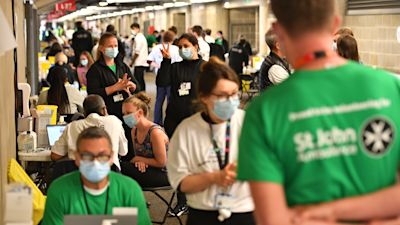Explainer
Covid vaccines for 16 and 17 year olds: When can I book one and do I need my parents' permission?

Almost every over 16 in the UK is now eligible for a coronavirus vaccination after regulators recommended 16 and 17 year olds will also be offered a jab.
With 73% of people in the UK aged 18 and over now fully vaccinated, the government has accepted a recommendation from the Joint Committee on Vaccination and Immunisation (JCVI) that the vaccination programme should move onto immunising healthy 16 and 17-year-olds.
Data released on Wednesday showed fully vaccinated people are half as likely to catch the virus as their unvaccinated counterparts.
Here's some of the key questions answered on the vaccination programme for 16 and 17 year olds, and why the decision to offer jabs to them has been made now:
How many people will be eligible for a jab?
Thousands of young people in the UK have already been vaccinated or offered an appointment, leaving around 1.4 million 16 and 17 year olds still to be jabbed, according to the Office for National Statistics.
Young people already eligible include 16 to 17 year olds with underlying health conditions and children aged 12 to 15 with certain conditions which make them vulnerable to coronavirus. Jabs are also available for those aged 12 to 17 who live with an immunosuppressed person, such as a parent or grandparent. The advice for those younger than 16 has not changed.
Across the nation, 223,755 under-18s have received a first dose and almost 80,000 have had a second dose, according to NHS data to July 25.
What data has led to this decision being made now?
Various trials on giving children coronavirus vaccines have been ongoing for months.
Pfizer, which is the vaccine under-18s will receive, conducted trials on 2,000 12 to 15 year olds in October last year and found it was safe.
And the Medicines and Healthcare products Regulatory Agency (MHRA) has already approved the Pfizer/BioNTech Covid-19 vaccine for children aged 12 and over.
So it's already being safely used on over 12s in the UK who live with immunosuppressed adults and countries around the world have been vaccinating teenagers for months.
International data showed that the benefits of the vaccine outweigh the risks, and trials on children found no new adverse effects compared to those experienced by young adults.
The MHRA rules on the quality, safety and effectiveness of medicines in the UK, while the JVCI looks at data on the impact of a disease, data from clinical trials and modelled data, then advises government on the best way to get these vaccines to the public.
Will 16 and 17 year olds need parental consent?
Vaccine centres which have already started vaccinating 16 and 17 year olds have required the consent of a parent or guardian before immunising teenagers, but it is not strictly necessary.
In the UK, if a child is considered able to understand the risks and benefits (and there is no specific age for this) then the child is able to give their own consent.
That is understood to be the most appropriate consent, even if parents or guardians do not approve.
When will it be rolled out?
It is not yet clear when exactly 16 and 17 year olds will be offered the vaccine, but ITV News understands it is not likely to this week.
The NHS is understood to be working on logistical plans for vaccinating 16 and 17 year olds, with schools or colleges being possible settings.
Plans will be laid out by the NHS very shortly, it is understood.
While adults have to wait eight weeks after their first vaccine dose before receiving their second, the case could be different for children.
It has not yet been set out how much of a delay there should be between doses - the JVCI says it will set out advice on second doses after assessing data from the first doses.
Other countries around the world have a delay of three weeks for their young people.
Will these vaccines impact how much we give to other countries?
The UK's commitment to the Covax programme, which provides developing countries with vaccinations, is not likely to be impacted by the rollout to 16 and 17 year olds.
It's understood that the UK has enough vaccine supplies to immunise children, offer booster jabs to the most vulnerable and continue helping other countries.
Will 16 and 17-year-olds take up the offer of a jab?
Even though the vaccine programme has been open to all those 18 and over for some time now, there are still around 2.8 million 18-29-year olds who are completely unvaccinated.
Officials have started incentive schemes to encourage younger adults to take up the jab offer.
It remains to be seen what proportion of younger teenagers take up the offer.